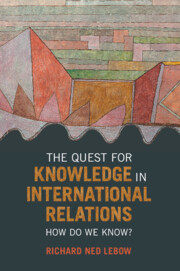Book contents
- The Quest for Knowledge in International Relations
- The Quest for Knowledge in International Relations
- Copyright page
- Dedication
- Contents
- Preface
- 1 Introduction
- Part I What Is Knowledge?
- Part II How Do We Acquire Knowledge?
- Part III How Do We Claim Knowledge?
- Part IV Reason and Cause
- Part V Conclusions
- 16 International Relations as an Ethical Practice
- Index
16 - International Relations as an Ethical Practice
from Part V - Conclusions
Published online by Cambridge University Press: 07 April 2022
- The Quest for Knowledge in International Relations
- The Quest for Knowledge in International Relations
- Copyright page
- Dedication
- Contents
- Preface
- 1 Introduction
- Part I What Is Knowledge?
- Part II How Do We Acquire Knowledge?
- Part III How Do We Claim Knowledge?
- Part IV Reason and Cause
- Part V Conclusions
- 16 International Relations as an Ethical Practice
- Index
Summary
In this book, I posed three set of questions about each epistemology: how it defines knowledge, how it seeks it, and how its adherents claim to have found it. I have stressed the differences between positivism and interpretivism, but there is also considerable variation within them, variation that should encourage dialogue not only within but also across epistemologies. I discuss some of the forms this dialogue might take and the ways in which researchers in each tradition can learn.
- Type
- Chapter
- Information
- The Quest for Knowledge in International RelationsHow Do We Know?, pp. 221 - 234Publisher: Cambridge University PressPrint publication year: 2022

